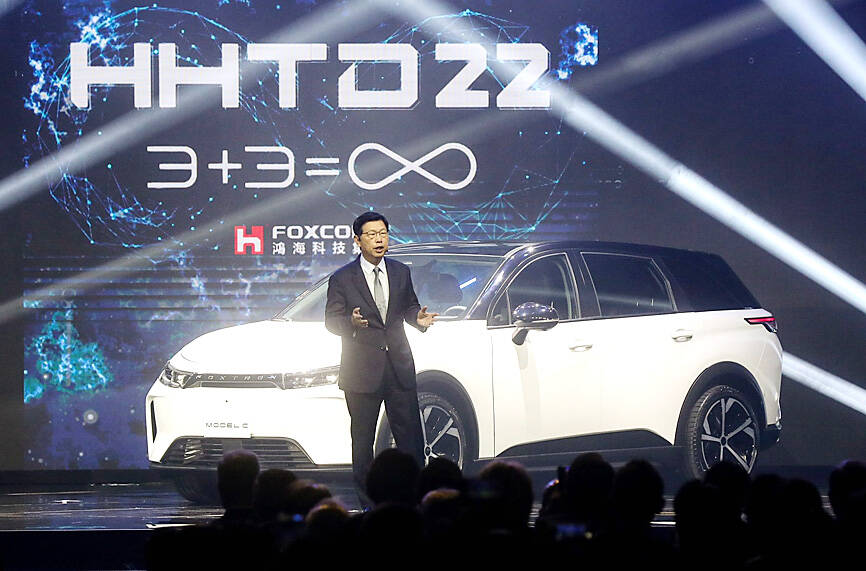Saudi Arabia’s Public Investment Fund Program (PIF) on Thursday said it plans to make electric vehicles (EV) in the kingdom under a joint venture, to be called Ceer, with Apple Inc supplier Foxconn Technology Group (富士康科技集團) as part of a push to build new industries and reduce its reliance on oil.
Ceer “is the first Saudi automotive brand to produce electric vehicles in Saudi Arabia, and will design, manufacture and sell a range of vehicles for consumers in Saudi Arabia and the MENA [Middle East and North Africa] region, including sedans and sports utility vehicles,” PIF said in a statement.
Its vehicles would be available in 2025, the fund said, adding that Ceer would draw more than US$150 million in foreign direct investment, create up to 30,000 direct and indirect jobs, and is projected to contribute US$8 billion to the kingdom’s GDP by 2034.

Photo: Cheng I-hwa, Bloomberg
The joint venture “will license component technology from BMW for use in the vehicle development process,” PIF said.
“Foxconn will develop the electrical architecture of the vehicles, resulting in a portfolio of products that will lead in the areas of infotainment, connectivity and autonomous driving technologies,” it added.
An investment strategy announced last year aims for more than US$100 billion in foreign direct investment annually, although Saudi Arabia lags behind those targets with more than US$4 billion in inflows in the first half of this year.
Chaired by Saudi Arabian Crown Prince Mohammad bin Salman, PIF is his chosen method to push efforts to diversify his country’s economy and wean it off oil.
Lucid Group Inc, which is more than 60 percent owned by PIF, is building an electric vehicle assembly plant in Jeddah, with a projected capacity to manufacture 150,000 vehicles a year.
The Saudi Arabian government signed a deal with Lucid to purchase up to 100,000 of its vehicles over the next 10 years.
The kingdom is also making a push into mining and said in May it would build an electric vehicle battery metals plant.
“We will leverage Foxconn’s technological expertise to support Ceer’s vision of creating a range of iconic electric vehicles that are built around the themes of connectivity, infotainment and autonomy,” Foxconn chairman Young Liu (劉揚偉) said, according to PIF’s statement.
“We want to make electric vehicles mainstream, and that is what Ceer is going to achieve in Saudi Arabia and the wider region,” he added.
PIF did not disclose funding details and did not say how much a Ceer plant would cost or where in the kingdom it would be built.
The Wall Street Journal in March reported that Saudi Arabia and Foxconn were in talks to jointly build a US$9 billion facility that could make microchips, electric vehicle components and other electronics in Neom, a futuristic US$500 billion city being built in Saudi Arabia’s desert.

TAKING STOCK: A Taiwanese cookware firm in Vietnam urged customers to assess inventory or place orders early so shipments can reach the US while tariffs are paused Taiwanese businesses in Vietnam are exploring alternatives after the White House imposed a 46 percent import duty on Vietnamese goods, following US President Donald Trump’s announcement of “reciprocal” tariffs on the US’ trading partners. Lo Shih-liang (羅世良), chairman of Brico Industry Co (裕茂工業), a Taiwanese company that manufactures cast iron cookware and stove components in Vietnam, said that more than 40 percent of his business was tied to the US market, describing the constant US policy shifts as an emotional roller coaster. “I work during the day and stay up all night watching the news. I’ve been following US news until 3am

UNCERTAINTY: Innolux activated a stringent supply chain management mechanism, as it did during the COVID-19 pandemic, to ensure optimal inventory levels for customers Flat-panel display makers AUO Corp (友達) and Innolux Corp (群創) yesterday said that about 12 to 20 percent of their display business is at risk of potential US tariffs and that they would relocate production or shipment destinations to mitigate the levies’ effects. US tariffs would have a direct impact of US$200 million on AUO’s revenue, company chairman Paul Peng (彭雙浪) told reporters on the sidelines of the Touch Taiwan trade show in Taipei yesterday. That would make up about 12 percent of the company’s overall revenue. To cope with the tariff uncertainty, AUO plans to allocate its production to manufacturing facilities in

Six years ago, LVMH’s billionaire CEO Bernard Arnault and US President Donald Trump cut the blue ribbon on a factory in rural Texas that would make designer handbags for Louis Vuitton, one of the world’s best-known luxury brands. However, since the high-profile opening, the factory has faced a host of problems limiting production, 11 former Louis Vuitton employees said. The site has consistently ranked among the worst-performing for Louis Vuitton globally, “significantly” underperforming other facilities, said three former Louis Vuitton workers and a senior industry source, who cited internal rankings shared with staff. The plant’s problems — which have not

COLLABORATION: Given Taiwan’s key position in global supply chains, the US firm is discussing strategies with local partners and clients to deal with global uncertainties Advanced Micro Devices Inc (AMD) yesterday said it is meeting with local ecosystem partners, including Taiwan Semiconductor Manufacturing Co (TSMC, 台積電), to discuss strategies, including long-term manufacturing, to navigate uncertainties such as US tariffs, as Taiwan occupies an important position in global supply chains. AMD chief executive officer Lisa Su (蘇姿丰) told reporters that Taiwan is an important part of the chip designer’s ecosystem and she is discussing with partners and customers in Taiwan to forge strong collaborations on different areas during this critical period. AMD has just become the first artificial-intelligence (AI) server chip customer of TSMC to utilize its advanced